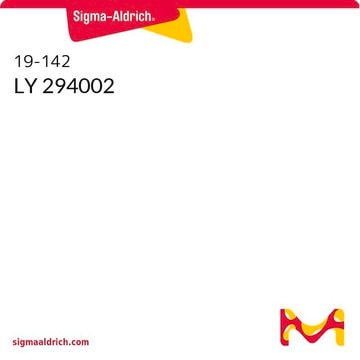440204
LY 294002
InSolution, ≥98%, 10 mM, reversible and specific inhibitor of PI 3-kinase
Synonym(s):
InSolution LY 294002, 2-(4-Morpholinyl)-8-phenyl-4H-1-benzopyran-4-one, BRD2 Inhibitor IV, BRD3 Inhibitor III, BRD4 Inhibitor IV
About This Item
Recommended Products
Quality Level
Assay
≥98% (HPLC)
form
liquid
manufacturer/tradename
Calbiochem®
storage condition
OK to freeze
protect from light
shipped in
wet ice
storage temp.
−20°C
InChI
1S/C19H17NO3/c21-17-13-18(20-9-11-22-12-10-20)23-19-15(7-4-8-16(17)19)14-5-2-1-3-6-14/h1-8,13H,9-12H2
InChI key
CZQHHVNHHHRRDU-UHFFFAOYSA-N
Biochem/physiol Actions
phosphatidylinositol 3-kinase
Packaging
Warning
Physical form
Reconstitution
Other Notes
Baumann, P., and West, S.C. 1998. Proc. Natl. Acad. Sci. USA95, 14066.
Cardone, M.H., et al. 1998. Science282, 1318.
Vlahos, C.J., et al. 1995. J. Immunol.154, 2413.
Yano, H., et al. 1995. Biochem. J.312, 145.
Vlahos, C.J., et al. 1994. J. Biol. Chem.269, 5241.
Selected Citations
Lee, J., et al. 2009. Cell Stem Cell5, 76.
Legal Information
Storage Class Code
10 - Combustible liquids
WGK
WGK 1
Flash Point(F)
188.6 °F - (refers to pure substance)
Flash Point(C)
87 °C - (refers to pure substance)
Certificates of Analysis (COA)
Search for Certificates of Analysis (COA) by entering the products Lot/Batch Number. Lot and Batch Numbers can be found on a product’s label following the words ‘Lot’ or ‘Batch’.
Already Own This Product?
Find documentation for the products that you have recently purchased in the Document Library.
Our team of scientists has experience in all areas of research including Life Science, Material Science, Chemical Synthesis, Chromatography, Analytical and many others.
Contact Technical Service







